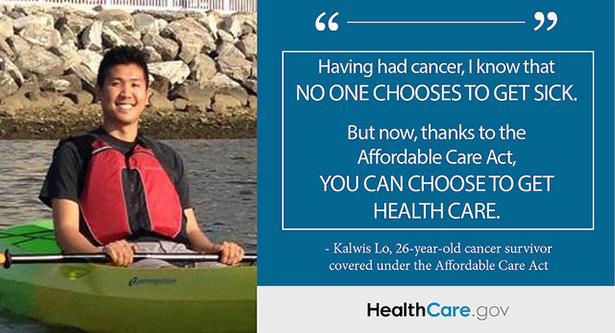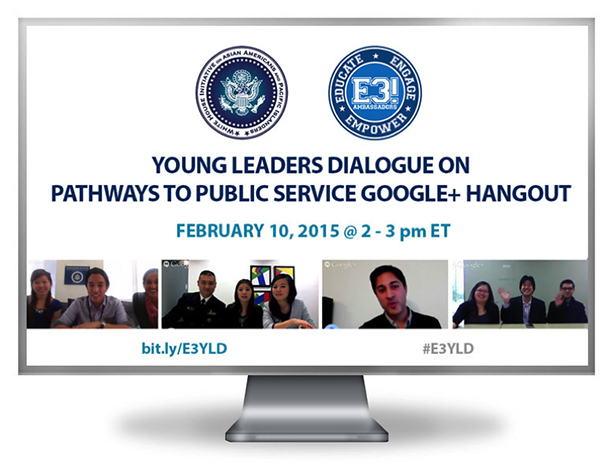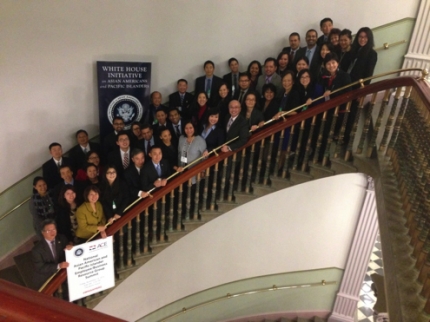Initiative on Asian Americans and Pacific Islanders Blog
Urging Asian Americans and Pacific Islanders to #GetCovered
Posted by on January 26, 2015 at 10:49 AM EST
The summer after he graduated from college, Kalwis Lo learned he had stage 3 Hodgkin’s lymphoma, a type of cancer that attacks the lymphatic system. His private health insurance plan denied him coverage for treatment, claiming the cancer diagnosis was a “pre-existing condition.” Every major private health plan turned him away. His family was forced to dip into their savings and ask friends and family for help to cover the cost of his testing and chemotherapy treatments. His family faced financial strain until Kalwis discovered that the Affordable Care Act created a temporary program for anyone denied coverage because of a pre-existing condition. He enrolled in the program and that fall, Kalwis was able to get the treatment he needed and today is cancer-free.
Kalwis’s story is one of the reasons why President Obama signed the Affordable Care Act into law. No one should be denied health insurance coverage when they need it most.
Unfortunately, many Asian Americans and Pacific Islanders (AAPIs) still lack health insurance coverage and don’t see a doctor on a regular basis. In fact, in 2010, nearly 24% of Asian Americans and over 37% of Native Hawaiians and Pacific Islanders reported that they had not seen a doctor in the past year. Through the Affordable Care Act, nearly 2 million uninsured AAPIs gained access to health insurance through the Health Insurance Marketplace, and it is likely that eight in 10 will qualify for financial assistance!
So today, I encourage all Americans -- including AAPIs across the country -- who have not enrolled for health insurance to learn more, get engaged, and enroll in health coverage through the Health Insurance Marketplace by February 15.
Learn more about Health CareYoung Leaders Dialogue on Pathways to Public Service: February 10
Posted by on January 14, 2015 at 6:17 PM EST
Please join the White House Initiative on Asian Americans and Pacific Islanders (WHIAAPI) and young leaders from across the country on Tuesday, February 10, 2015 from 2:00 – 3:00 p.m. ET for our Young Leaders Dialogue (YLD) Google+ Hangout on Pathways to Public Service! Similar to the YLD on Education in October 2014 and YLD on Mental Health in December 2014, this YLD will cover a variety of topics around public service.
During the YLD, Administration officials, community representatives, and young leaders will highlight opportunities to pursue careers and internships in public service. Speakers will discuss the Pathways Program for students and recent graduates, AAPI community-based programs for public service, and other resources and opportunities for young leaders interested in working in the federal government and Foreign Service. In addition, speakers will go over tips for preparing for a federal career. Most importantly, we’ll have an opportunity to hear from you on your issues, concerns, and questions!
2014: Year in Review for the White House Initiative on Asian Americans and Pacific Islanders
Posted by on December 23, 2014 at 12:55 PM ESTIn 2014, the White House Initiative on Asian Americans and Pacific Islanders (WHIAAPI) celebrated its 15th anniversary and five years under President Barack Obama. It has been a year of many milestones, from helping millions of Americans gain health insurance under the Affordable Care Act, to giving new hope to immigrant families with the President’s executive actions on immigration. WHIAAPI’s created new opportunities and resources for community-based organizations, Asian American and Pacific Islander (AAPI)-owned businesses, and researchers and policymakers. We’ve connected with communities across the country, in all ten federal regions, including Guam and Hawaii.
WHIAAPI is honored to share with you a number of memorable moments in 2014. Please check out some of our photo and video highlights from the year and tweet your favorites using the hashtag #WHIAAPI.
Promoting Positive Mental Health and Support for Young AAPI Leaders
Posted by on December 22, 2014 at 4:39 PM ESTOn December 9, 2014 the White House Initiative on Asian Americans and Pacific Islanders (WHIAAPI) held its second Young Leaders Dialogue (YLD) Google+ Hangout, focused on Mental Health. This is the second installment of a four part YLD series happening in conjunction with the E3! Ambassadors Program, comprised of young leaders across the nation committed to increasing opportunity and improving the quality of life for AAPIs. These E3! Ambassadors aim to “Educate, Engage and Empower” young leaders, by highlighting federal programs and resources for AAPIs around the issues of education, mental health, pathways to public service and Deferred Action for Childhood Arrivals (DACA). The first YLD on Education took place in October 2014.
During the recent YLD on Mental Health, Juliet Bui from the Substance Abuse and Mental Health Services Administration (SAMHSA) and DJ Ida from the National Asian American Pacific Islander Mental Health Association (NAAPIMHA) shared the barriers AAPIs face when dealing with mental health issues, the incredible wealth of resources that are available for addressing these issues, and the benefits of positive mental health. Federal resources like the SAMHSA Treatment Referral Helpline (1‑877‑SAMHSA7) and the National Suicide Prevention Lifeline (1-800-273-TALK) serve as valuable tools where callers can get general information on mental health and talk directly to trained crisis workers. In addition, speakers discussed the warning signs of people who may be considering suicide and how friends and family can create a safe, supportive space for the person to talk and how to make a referral to someone trained in crisis intervention and suicide prevention. Above all, speakers highlighted that friends and family do make a difference and can raise awareness around mental health for AAPIs.
The YLD on Mental Health closed out the event series for 2014, and we look forward to opening the New Year with our YLD on Pathways to Public Service in February 2015. YLDs are a way for young leaders to learn about federal resources available around issues that affect them, and share their personal stories. Each dialogue features Administration officials, community leaders, and other experts on the topic and can provide valuable information to increase access and opportunity for young AAPIs.
To find ways to engage your community around these issues, check out our mental health toolkit, and stay tuned for our upcoming YLD on Pathways to Public Service in February 2015.
Jason Tengco is a Senior Advisor and Bessie Chan is an Advisor at the White House Initiative on Asian Americans and Pacific Islanders.
Learn more about Health CareEmpowering AAPI-Owned Businesses Through Federal Resources
Posted by on December 11, 2014 at 9:40 AM ESTWith the holidays coming up, it is an opportune time for us to recognize the businesses that support and help our economy grow healthier and make the season more special. The White House recently released its employment situation in November and shared the good news that the private sector has added nearly 11 million jobs over 57 straight months of job growth, extending the longest streak on record. A big contributor to this success is Asian American and Pacific Islander (AAPI)-owned businesses throughout the country. AAPI-owned businesses, like other minority-owned businesses, continue to grow and create jobs in difficult times, testifying to their important role in helping drive economic recovery and growth.
In just five years, the number of small businesses owned by Asian Americans grew 40 percent. The number of small businesses owned by Pacific Islanders grew by 30 percent. With more than 1.5 million AAPI-owned businesses in the United States generating more than $500 billion in sales annually and employing more than 2.8 million workers, their success is critical to the overall economy.
The White House Initiative on Asian Americans and Pacific Islanders’ Executive Order speaks explicitly to the power of the Initiative to connect AAPI-owned businesses to business development, counseling, and capital in the federal government. To that end, we are excited to launch a website dedicated to connecting AAPI-owned businesses to federal resources.
White House Engages Asian American and Pacific Islander Business Leaders
Posted by on December 9, 2014 at 12:52 PM ESTToday there are roughly 1.6 million Asian American and Pacific Islander (AAPI)-owned businesses in the United States, generating more than $500 billion in sales and employing more than 2.8 million people. In addition, half of AAPIs hold college degrees, providing a steady stream of educated workers into our country’s growing workforce. Yet despite these important achievements, AAPIs face unique challenges, such as being less likely to seek government services or advance to the highest levels of government or in corporate America.
The White House Initiative on Asian Americans and Pacific Islanders (WHIAAPI) strives to advance access to the federal government for all AAPIs in the country. This includes promoting business development opportunities in the AAPI community by fostering more collaborative public-private partnerships that will create new, sustainable jobs; build leadership in government and in the private sector; find solutions for workforce challenges; and expand opportunities that advance arts and culture as means to demonstrate the value we as a community bring to business.
On November 14, 2014, WHIAAPI partnered with the Asian/Pacific Islander American Chamber of Commerce & Entrepreneurship (ACE) to hold a National Employee and Business Resource Group (ERG/BRG) Summit for AAPI business leaders at the White House. Seventy-five business leaders and members of ERG/BRGs from various industries, including banking and finance, retail, utilities, telecommunications, technology, manufacturing, health care, insurance, and food, convened to discuss collaborative opportunities, best practices, and resources to advance the AAPI business community.
- &lsaquo previous
- …
- 4
- 5
- 6
- 7
- 8
- 9
- 10
- 11
- 12
- …
- next &rsaquo
White House Blogs
- The White House Blog
- Middle Class Task Force
- Council of Economic Advisers
- Council on Environmental Quality
- Council on Women and Girls
- Office of Intergovernmental Affairs
- Office of Management and Budget
- Office of Public Engagement
- Office of Science & Tech Policy
- Office of Urban Affairs
- Open Government
- Faith and Neighborhood Partnerships
- Social Innovation and Civic Participation
- US Trade Representative
- Office National Drug Control Policy
categories
- AIDS Policy
- Alaska
- Blueprint for an America Built to Last
- Budget
- Civil Rights
- Defense
- Disabilities
- Economy
- Education
- Energy and Environment
- Equal Pay
- Ethics
- Faith Based
- Fiscal Responsibility
- Foreign Policy
- Grab Bag
- Health Care
- Homeland Security
- Immigration
- Innovation Fellows
- Inside the White House
- Middle Class Security
- Open Government
- Poverty
- Rural
- Seniors and Social Security
- Service
- Social Innovation
- State of the Union
- Taxes
- Technology
- Urban Policy
- Veterans
- Violence Prevention
- White House Internships
- Women
- Working Families
- Additional Issues

